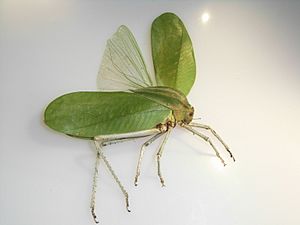Phyllophorinae facts for kids
Quick facts for kids Phyllophorinae |
|
|---|---|
 |
|
| Siliquofera grandis | |
| Scientific classification |
|
| Kingdom: | Animalia |
| Phylum: | Arthropoda |
| Class: | Insecta |
| Order: | Orthoptera |
| Suborder: | Ensifera |
| Family: | Tettigoniidae |
| Subfamily: | Phyllophorinae Stål, 1874 |
| Genera | |
|
See text |
|
The Phyllophorinae are a special group of insects. They are a subfamily of the bush crickets or katydids. You can find these amazing creatures living in tropical parts of Asia and Australia. They are known for their unique appearance, often blending in with leaves.
What are Phyllophorinae?
Phyllophorinae are part of a larger family called Tettigoniidae. This family includes all the different kinds of bush crickets and katydids. These insects are famous for the sounds they make, especially at night. They use their wings to "sing" and attract mates.
Where Do They Live?
These fascinating insects prefer warm, tropical climates. They are mostly found in parts of Asia, but specifically in peninsular Malaysia on the mainland. You can also discover them living across Australia. Their habitats are usually places with lots of trees and plants, where they can hide easily.
Different Kinds of Phyllophorinae
Scientists group living things into different categories. A "genus" is a group of very similar species. The Orthoptera Species File is a big list that helps scientists keep track of all the different kinds of insects in the Orthoptera order, which includes crickets and grasshoppers. Here are some of the genera (groups) that belong to the Phyllophorinae subfamily:
- Hyperhomala Serville, 1831
- Microsasima: For example, M. stueberi de Jong, 1972
- Parasasima: For example, P. elegans Willemse, 1955
- Phyllophora Thunberg, 1815
- Phyllophorella Karny, 1924
- Phyllophorina Karny, 1924
- Sasima Bolívar, 1903
- Sasimella Karny, 1924
- Sasimoides Karny, 1924: For example, S. spinosissima Karny, 1924
- Siliquofera Bolívar, 1903: For example, S. grandis (Blanchard, 1853)
- Siliquoferella: For example, S.emarginata Karny, 1924
- Strongyloderus: For example, S. serraticollis Westwood, 1834
See also
 In Spanish: Phyllophorinae para niños
In Spanish: Phyllophorinae para niños

